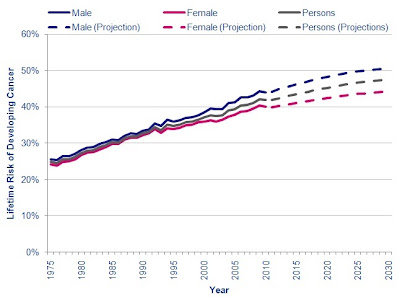More on Angelina Jolie, defective BRCA genes, and causes of cancer
 |
| Image courtesy Cancer Research UK |
Though poor diets, lack of exercise, and genetic susceptibilities amplify one's risk of cancer, these are just RISK FACTORS; they are not causes of the disease. Risk factors and causes are not the same, although they are commonly conflated by the public, by medical professionals, and by scientists who should know better. Furthermore, beware the opportunists selling cures; eating well and healthfully is vitally important to overall health, but there are no "superfoods" that will prevent cancer if you have been exposed to enough carcinogens.
 |
| Image courtesy Cancer Research UK |
Carcinogenic exposures cause mutations to our DNA which can (and often do) lead to cancer. Endocrine disrupting chemicals, which are ubiquitous in our air, food, water, and consumer products can more indirectly lead to cancer. The exponential increase in these known carcinogenic agents and potential carcinogens in our environments corresponds with the increase in cancer rates, particularly in industrialized nations. (Note the increase in numerous cancers in China as their industrial development has exploded over the past several decades.) The fact that cancer can be detected more easily now and the fact that we have a larger aging population who will live longer and thus have a higher risk of contracting cancer does not explain why cancers such as breast, colorectal, thyroid, and testicular have increased in the 24-40 age group over the past decade and a half. Indeed, this age group is comprised of so-called "Generation X" - a generation of individuals with a much smaller population size than that of the Baby Boomers or Millennials. Thus, because of their small population size, Generation X should see less individual numbers of cancer diagnoses not more, if overall cancer rates were remaining stagnant. This increase in cancers among the middle-aged is an alarming trend and may portend a very grim future in terms of cancer rates among generations to come. Moreover, this trend absolutely cannot be explained statistically by genetic inheritance.
We can reduce and eliminate at least some of these exposures with greater regulation and banning of so many unnecessary chemicals and technologies. Ubiquitous exposure to carcinogens is not inevitable, nor does cancer need to be. To hear more, please listen to Feminist Magazine from June 18, 2013:
Feminist Magazine 6/18/13



Comments